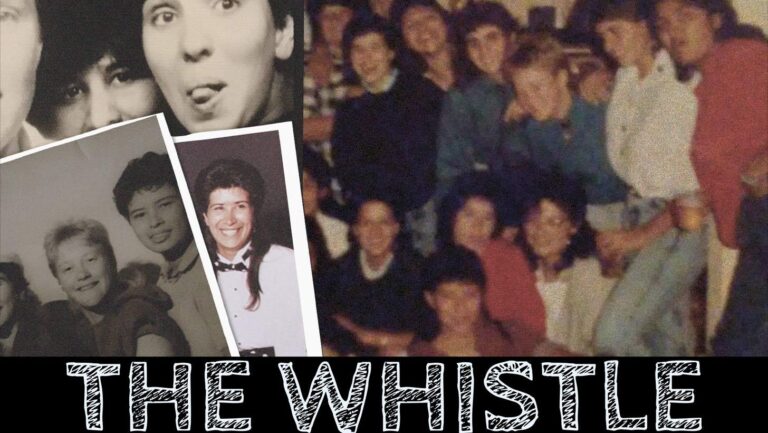Albuquerque in the ’80s was a very different city than it is now. The Isotopes were still the Dukes, Central Avenue was still driveable, and the local queer culture was a lot more underground. But in this much more closeted Albuquerque, there was a group of dyke youths who created a simple code for identifying themselves and communicating with others like them—the “dyke whistle.”StormMiguel Florez, a trans man filmmaker who came out and came of age in that Albuquerque, tells the story of this code in The Whistle, a new documentary premiering at the KiMo Theatre this Friday, Sept. 20. “I think our support network and particular culture were pretty unique for LGBTQ youth in the ’70s and ’80s, especially outside of urban areas like New York and San Francisco,” says Florez. “I’m thrilled to premiere in Albuquerque.” As a lead-up to the film’s upcoming premiere, Weekly Alibi spoke with Florez about culture, communication and coming out.Weekly Alibi: What made the dyke culture in Albuquerque so special and so different from that of bigger cities like NYC or San Francisco?StormMiguel Florez: I wasn’t in either of those places at the time, so what I can say is just from talking to people who were out in the ’80s. I hear [queer] people from other places saying, “I didn’t know anybody like me when I was growing up.” Even from folks in big cities! As queers, we tend to get together to talk about our coming out stories. So [the dyke whistle] is always a story I’ve shared with folks, including folks from New York and San Francisco, and I’ve never heard of anything similar. It was very specific to New Mexico. How cool is it that this group of teens got to come out as teens and just be teens? And have cool ways of connecting with each other among the other teens? Charlene is one of the people I talk to in the film. We always talk about how we got to feel cute [in high school]. We got to dress how we wanted and look in the mirror and feel like we were living our authentic, gender-weird selves. Our people have always expressed ourselves the way we need to, but it has not always been received.Talk about the “dyke whistle.” Was it specifically a “I’m checking you out” thing or just a “I see you, fellow dyke” thing?Both, for sure. There was one person in our community who was kind of a lipstick lesbian, and she used it as a way to say “I’m a lesbian too” to people she was interested in, because they wouldn’t always catch on otherwise. The way that I used it, and the way it was used around me was—if I saw somebody I knew from far away, I could whistle and get their attention. Or if I saw somebody I thought was a lesbian, I would whistle, and they would turn and usually give a shy little nod. Dana Goldberg was performing in Albuquerque last Saturday, she’s a lesbian comedian. One of the event partners for The Whistle was one of the partners for that event too. They did an announcement about this film at the event, and apparently a bunch of people in the crowd did the whistle! That made me feel great.Why do you think this happened in Albuquerque?Something about the big New Mexico Catholic culture means that there is … not really acceptance, but it means that family is everything to so many people here. People were getting to be who they were without getting kicked out of their homes. And as one participant [in the film] said, there’s kind of this live and let live attitude in New Mexico. Which is a trip, because it’s surrounded by other states which are very much not that way. Tell us some about the making of the film.I started calling people around 2016. I had to deadname myself [Florez used his old name from when he identified as a woman], because a lot of these people didn’t know me as a trans man. Mostly the people who participated were folks I knew who I hadn’t seen in years and some people who I had never met. The next year me and my partner came out here and interviewed people, shot some B-roll of the landscape. We called a bunch of people in to kind of have a reunion. Part of the process of filming has been building and rebuilding these old relationships. It’s been really amazing.Why do you think it’s important to tell this story?When we talk about history, we talk about the big important stuff—what happened at Stonewall, what happened in Compton—they’re necessary stories. It’s important to know whose shoulders we stand on. But what we don’t hear about is post-Stonewall, pre-internet [queer history]. ’70s and ’80s. Especially in the dyke community. Things are so uncertain right now. If and when something really awful happens—are we going to lose access to internet? Are we going to lose the ability to be—somewhat—safely out? Learning how people did this before all that access could help us in the future. We’ve always been resilient and we can continue to be.
The Whistle movie premiereFriday, Sept. 20, 7:30pmKiMo Theatre (423 Central Ave. NW)”Pay What You Wish” tickets ($4 to $30) are available at kimotickets.com.Audio description for blind and low-vision attendees is available. This requires a smart phone and earbuds/earphones. Director StormMiguel Florez will be on hand to introduce the film.




